Posted on November 18, 2025 by Rebekah Alegria
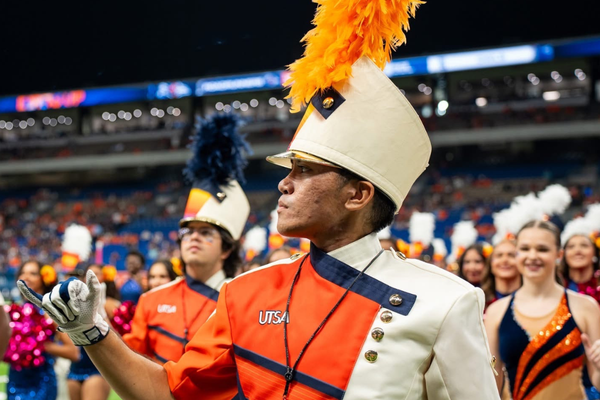
Spirit of San Antonio Marching Band Head Drum Major, Gabriel Perez (center), and Assistant Drum Major, Adrian Vazquez Mora (left), prepare to lead the band on the Alamodome field.
For business undergraduate students Gabriel Perez and Adrian Vazquez Mora, the leadership experience their gaining as drum majors also doubles as hands-on business training.
Perez, an accounting major graduating this December, serves as head drum major. Vazquez Mora, who earned a bachelor’s degree in art in 2024 and is now pursuing a second bachelor’s degree in marketing, is one of SOSA’s assistant drum majors.
“I've always been a very logistical thinker,” Perez said. "Accounting fits that side of me, and SOSA lets me apply it to a real organization everyday."
Gabriel Perez, head drum major of the Spirit of San Antonio Marching Band and senior accounting major
Vazquez Mora approaches it from a creative angle, using marketing to bridge his artistic background with his business degree.
“I wanted to pair something I love, the arts, with something that’s everywhere, which is business,” he said. “Marketing is so visual, and I’m a very visual person. Putting my art degree together with marketing just makes sense.”
Both drum majors arrived at UT San Antonio during an unusual time. As COVID-era high school seniors, they missed their full final season of marching band and were determined to get that sense of community back while in college.
For Vazquez Mora, who initially entered UT San Antonio as a CAP student planning to transfer, SOSA quickly became the reason to stay.
“One of the main reasons I was still attracted to UTSA was actually SOSA,” he said. He soon found himself auditioning for drum major, working on campus and discovering new interests beyond film and art.
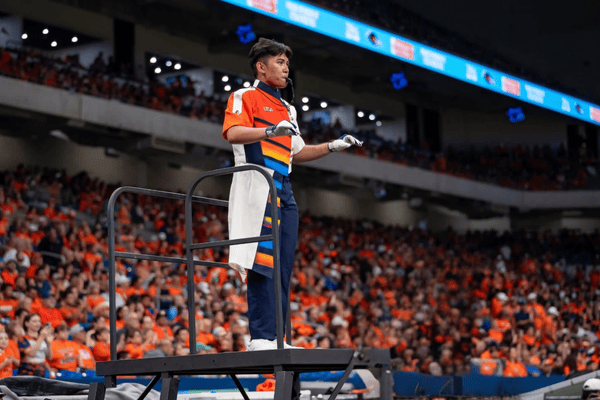
Perez moved from California and found an interest in UT San Antonio through YouTube videos of SOSA’s iconic shows.
“I kept watching videos and picturing myself on the field at the Alamodome,” he recalled.
Both had held leadership roles in high school band, but college leadership offered something more: a chance to give back to a program that now shaped their identities as Roadrunners.
For Vazquez Mora, leadership feels like working behind the scenes on a production, more like a director than an actor. He thinks in terms of planning, execution and “post-production” adjustments to get to the final product. Perez describes his path as a steady progression through roles--student staff, assistant drum major, then head drum major--driven by a desire to support the program that gave him community, friendships and opportunities.
As business students, the pair see SOSA as more than a student organization. To them, it functions like a live case study in organizational structure, culture and operations.
Perez often maps SOSA to a business hierarchy: the director as CEO, staff handling budgets and logistics, drum majors as HR-style leaders enforcing expectations and supporting members and student staff as frontline supervisors. That mental model has helped him stay organized and avoid feeling like everything rests solely on his shoulders.
Once he began viewing SOSA’s moving parts like departments within a company, he said, it became easier to delegate, prioritize and lead with a big-picture mindset.
Vazquez Mora, meanwhile, leans into the marketing side. Recognizing that every instrument section had its own social media presence except the drum majors, he launched a dedicated Instagram account (@utsadrummajors) and took the lead on content strategy. He taught himself tools like Photoshop, studied other accounts for inspiration and began building a portfolio of graphics and videos that showcase the drum major team’s work and personality. 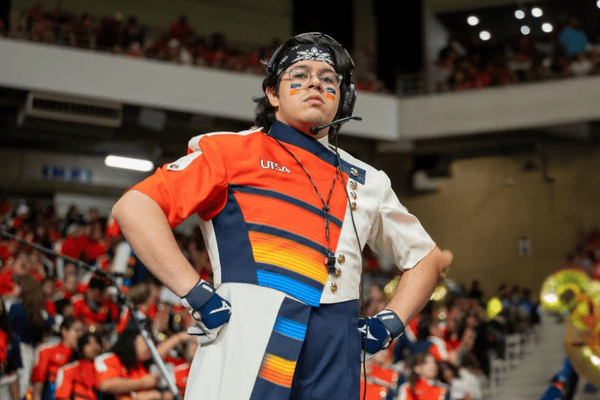
“Creating something from nothing and giving us a way to express ourselves has been really rewarding,” he said.
Leading more than 300 peers, many of whom are also juggling classes, jobs and other commitments, requires intentional communication.
Vazquez Mora focuses on helping members see the value of their work and the doors SOSA can open. Band camp, he notes, gives new students an instant network and sense of belonging before their first week of classes even begins.
“We remind them that what we're doing makes an impact," said Vazquez Mora. "We represent the university, we learn time management and routine and we're part of the largest student organization on campus. Leadership is about selling the idea that what we do matters."
Adrian Vazquez Mora, '24 assistant drum major of the Spirit of San Antonio Marching Band and senior marketing major
Perez emphasizes consistency and presence. Rather than relying on one big speech, he uses everyday interactions to reinforce the culture he wants to build--brief check-ins before rehearsal, quick pep talks when energy dips and simple gestures that show members he sees them as people, not just positions on a field.
“If you say a goal once and leave it, it dies,” he said. “You have to live it. If we say we want a positive social environment, that means being out there, talking to people and being approachable. People remember those moments.”
Those habits mirror what employers increasingly expect from managers and leaders: authenticity, clarity, empathy and the ability to rally a team toward a shared goal.
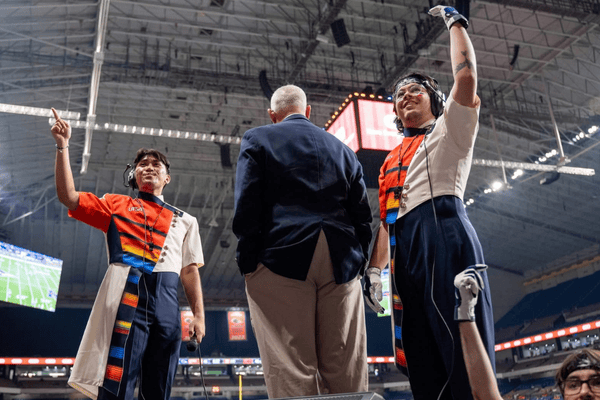
The skills Perez and Vazquez Mora practice on the podium directly support their work in the Business Building.
SOSA has taught them to be concise and intentional when they speak. In rehearsal, they have limited time to give instructions, feedback or direction. That pressure has sharpened their ability to “read the room,” choose words carefully and deliver clear, focused messages, skills that translate naturally into class presentations, group projects and interviews.
“In leadership, you don’t have a lot of time,” Vazquez Mora said. “It’s like an elevator pitch. You have to think about how you present an idea and use your words well.”
Perez sees a noticeable difference when he works with classmates who haven’t had similar leadership experiences.
“A lot of people are data-driven, which is important,” he said, “but they can struggle with keeping things concise. SOSA forced me to practice that constantly. Now in group projects, I’m able to help organize our ideas into short, clear presentations. That came more from band than from a textbook.”
Their coursework reinforces those lessons. Assistant Professor of Art and Art History Printmaking Juan Mora challenged Vazquez Mora to take creative risks and pair his artistic strengths with a practical path forward. And in the Carlos Alvarez College of Business, David Blank, assistant professor of practice in marketing, expanded his thinking about global audiences and how culture shapes consumer behavior.
For Perez, Patrick Lee, associate professor of practice in accounting, became a key mentor--showing him that strong analytical skills and expressive, people-centered leadership can coexist. Both drum majors plan to carry their SOSA experience into their careers.
Perez aims to start in a staff role in accounting and eventually move into management positions, such as comptroller or accounts manager, roles where he can see the big picture, work across teams and present information to decision makers. He compares assembling financial reports for stakeholders to building a show: gathering key elements, shaping them into a clear narrative and performing with confidence.
Vazquez Mora hopes to blend his love for game-day atmospheres, visual storytelling and marketing. He imagines himself working with a college athletics department or sports team, capturing and promoting the energy of live events, while also collaborating with his brother’s growing film company.
“With marketing and art, you get to capture that glimpse of a performance forever,” he said. “That’s what draws me in.”
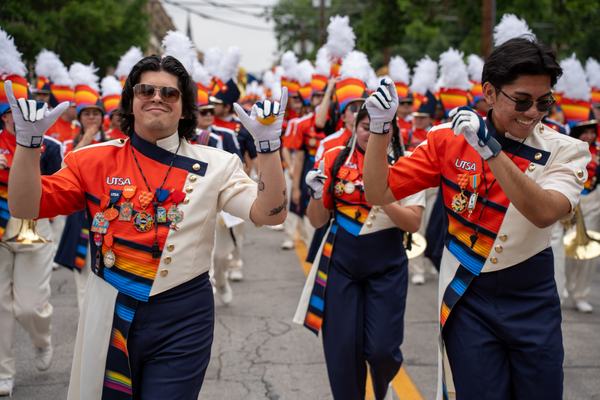
When asked what they would tell a first-year business student wondering if they can “do it all”--SOSA, classes, work and involvement--Perez’s answer is straightforward: yes.
“It’s totally doable if you want it,” he said, noting that the structure of rehearsals and game days actually helped him manage his time. “It gives you that urgency to get things done.”
Vazquez Mora adds that SOSA is one of the best ways to build a foundation, especially in the first year as a business student.
“SOSA is like its own little melting pot,” he said. “You meet people from different backgrounds and majors, you build connections and you learn how to balance everything. Those skills stay with you throughout your life and eventually in your career.”
Leadership, communication and strategic thinking are developed not just in Alvarez classrooms, but also on the field, one rehearsal, one halftime show and one conversation at a time.
Photos by B. Fletcher from SOSA - Spirit of San Antonio (UT San Antonio Marching Band) Facebook Page.

